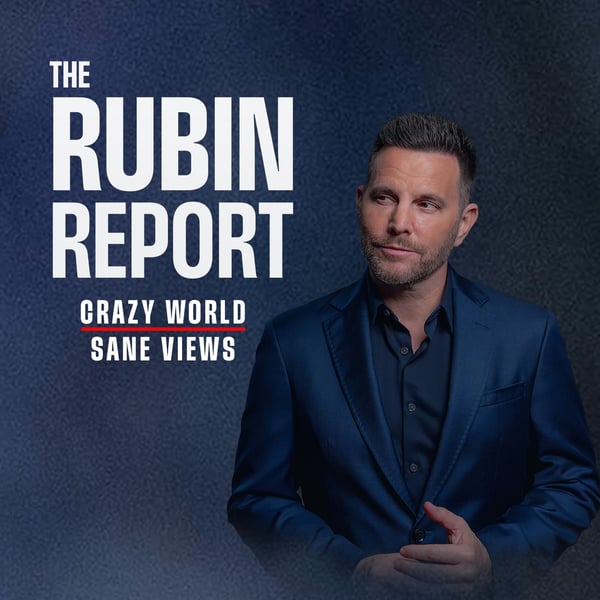Jordan Peterson and Dave Rubin LIVE IN NORWAY
The Rubin Report
Emma Dog Productions
4.5 • 13.9K Ratings
🗓️ 15 November 2018
⏱️ 56 minutes
🧾️ Download transcript
Summary
Transcript
Click on a timestamp to play from that location
| 0:00.0 | Ladies and gentlemen, Dr. Jordan Peterson. |
| 0:30.0 | No, we shouldn't say. No one further extroverted enthusiasm. |
| 0:43.0 | That's pretty sweet coming out to that, huh? Yeah, yeah, yeah. That's for sure. |
| 0:48.0 | All right. So here's what we're going to do. I want to go through some of the big questions that I've come up with during the last five or six months on the road with you, |
| 0:56.0 | which have just been an incredible, truly life-changing time for me. |
| 1:01.0 | And then we're going to end with Oslo's best question. You got 45 minutes, India? We'll see. All right. |
| 1:09.0 | So first off, every single night you are different. And I think tonight perhaps different, more different than any night so far. |
| 1:19.0 | How the hell do you do it? I honestly don't know. I usually go back in the green room with you for a little bit before, and about 10 minutes before show time, I walk out of there, and you say you need to think for a little bit. |
| 1:31.0 | And then you somehow do an hour and a half, summing up everything you think in a different way on any given night. |
| 1:39.0 | Well, there's some, I'll answer that technically. You know, the first thing is is that something I tell my students, you know, if you want to write an essay, you need a problem. |
| 1:52.0 | Because the essay is an attempt to solve a problem. So first of all, you need a problem. And then second, if you're going to devote time to the problem, then it should be like it should be a problem that is your problem. |
| 2:06.0 | At least a piece of it should be. You know, I have students all the time. They come up to me and they say, tell me what I should write my essay about. And they're often very annoyed that I haven't. You know, you didn't give us a topic. It's like, yes, that's because the topic is the difficult part of the assignment. |
| 2:24.0 | Right, to specify the problem. That's the difficult part of the assignment. In fact, when you're trying to, when you're trying to address a complex, let's say, domain of suffering, the diagnosis, which is the problem formulation is the crucial cognitive step. |
| 2:41.0 | So if you want to write, you need a problem. And if you want to write truthfully, then you need a problem that's yours. And if you want to write in a focused and aimed manner, then you unite, you're thinking around the problem. |
| 2:57.0 | And so one thing I always do before when I sit backstage is I think, okay, what's the problem for tonight? You know, and the problem for tonight was victim. So it was one statement. It's like, okay, let's explore the concept of victim and go down as far as we possibly can. |
| 3:17.0 | Okay, so then, well, then I would say, I have my knowledge organized in an idiosyncratic manner. And that's a consequence of having spent when I wrote, wrote my first book, which was Maps of Meaning. |
| 3:35.0 | I wrote every day for three hours, for 15 years. And I vowed when I started that I was going to make that what would you say, the highest duty that I had, nothing was going to come before that. |
| 3:55.0 | And there's a certain amount of cruelty in that because it meant that, you know, if my wife came into my office, then I would bark at her. And if my kids came into my office, I like a junkyard dog surrounded by barbed wire. |
| 4:07.0 | And there might be more pressing concerns and there might be more pressing concerns. And there might be more pressing concerns. And there might be more pressing concerns. |
| 4:17.0 | Including people who would just like to have something to do with you for a while or do something nice or have a problem fixed. It's like, no, go away. I've got three hours. |
| 4:29.0 | I was a thief and I took that from my life. And so I spent a very long time writing and thinking about the hardest problem that I could conceptualize. And that was the relationship between the individual and the atrocity committed in the service of totalitarian possession. It was the worst problem I could think of. How? |
| 4:55.0 | This episode of the Ruben report comes to you with support from our friends over at Bravo Company Manufacturing. You know, in the second amendment, the founding fathers guaranteed an individual the right to protect themselves. |
... |
Please login to see the full transcript.
Disclaimer: The podcast and artwork embedded on this page are from Emma Dog Productions, and are the property of its owner and not affiliated with or endorsed by Tapesearch.
Generated transcripts are the property of Emma Dog Productions and are distributed freely under the Fair Use doctrine. Transcripts generated by Tapesearch are not guaranteed to be accurate.
Copyright © Tapesearch 2025.

